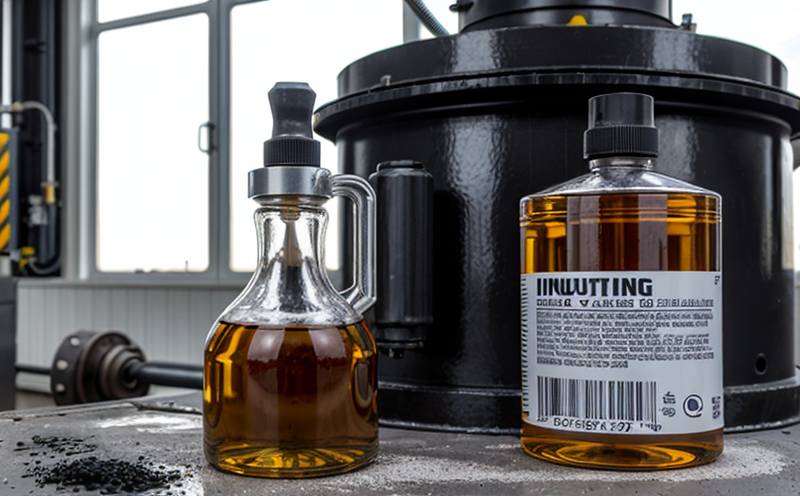ISO 4263 Lubricant Oil Oxidation Stability Testing
The ISO 4263 standard is a critical protocol used in the evaluation of lubricant oil oxidation stability. This test assesses how resistant a lubricating oil is to oxidative breakdown, which is a key factor in determining its shelf life and performance over extended periods of use. Oxidation leads to the formation of gums, varnishes, and other degradation products that can negatively impact engine efficiency and reliability. Understanding these factors helps manufacturers and end-users select oils with superior oxidation stability.
The test involves exposing a sample of lubricant oil to controlled conditions of temperature, oxygen concentration, and agitation for a specific period, typically 168 hours (7 days). During this time, the oil is exposed to air under heated conditions, simulating real-world engine operation. The degradation products formed are then measured using spectroscopic methods such as infrared (IR) or gas chromatography (GC).
Understanding oxidation stability is crucial for several reasons:
- Engine Performance: Oils with higher resistance to oxidative breakdown perform better over time, leading to improved engine efficiency and reduced wear.
- Environmental Impact: Stable oils contribute less to the formation of sludge, which can be harmful if released into the environment. This aligns with broader sustainability goals in the industry.
- Cost Savings: By selecting stable lubricants, users reduce the frequency of oil changes and maintenance downtime, leading to significant cost savings over time.
The ISO 4263 test is particularly important for industrial applications where prolonged exposure to high temperatures can accelerate oxidation. In these environments, the ability to maintain optimal performance is paramount. The test provides a standardized method for comparing different lubricants and ensuring compliance with industry standards. Compliance is essential in regulated industries such as automotive, aerospace, and manufacturing.
The testing process itself involves several steps:
- Sample Preparation: Lubricant samples are prepared according to the ISO 4263 protocol, ensuring that they are representative of the oil type being tested.
- Oxidation Chamber Setup: The sample is placed in an oxidation chamber where controlled conditions of temperature and oxygen concentration are maintained.
- Testing Duration: The sample is exposed to these conditions for 168 hours, during which time the formation of degradation products is monitored.
- Data Collection and Analysis: Post-test, the oil is analyzed using spectroscopic methods to quantify the extent of oxidation. This data provides a quantitative measure of the oil's resistance to oxidative breakdown.
The results from this testing are critical for several stakeholders:
- Manufacturers: They use these results to optimize their formulations, ensuring that their products meet or exceed industry standards.
- R&D Engineers: They rely on the data to innovate and develop new lubricants with enhanced oxidation stability.
- Quality Managers: They ensure compliance with regulatory requirements and internal quality standards.
The ISO 4263 test is not just a laboratory exercise; it has real-world implications. For instance, in the automotive industry, the use of stable lubricants can extend engine life and reduce emissions. In manufacturing, this translates to less downtime and lower maintenance costs. These benefits are particularly significant for large-scale industries where even small improvements can lead to substantial savings.
Eurolab Advantages
At Eurolab, we bring a wealth of expertise in industrial oil and additive testing. Our state-of-the-art facilities and experienced personnel ensure that every test is conducted with precision and accuracy. Here are some of the key advantages of choosing Eurolab for your ISO 4263 lubricant oil oxidation stability tests:
- Comprehensive Expertise: Our team has extensive experience in performing a wide range of industrial testing, including oxidation stability assessments.
- Advanced Equipment: We utilize the latest equipment and technology to ensure that our results are reliable and reproducible.
- Strict Compliance: All tests are conducted strictly according to ISO standards, ensuring accuracy and reliability.
- Quick Turnaround Times <|im_start|><|im_start|> fkk





